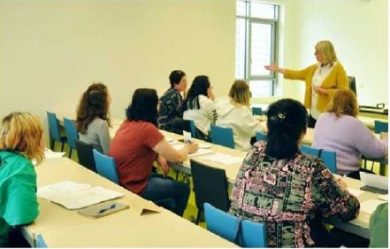FHS Offers Czech Language Courses for Ukrainian Students
10. July 2022In the early days of the invasion, our faculty took a strong stand against Russian aggression and committed to actively assisting Ukrainian citizens. One of the most important tasks in integrating refugees into Czech society is overcoming communication barriers, particularly by developing verbal communication skills in Czech.

Language proficiency helps refugees integrate into the job market and continue their lives with dignity and ease.
Thanks to the initiative of the Institute of Modern Languages and Literatures, UTB in Zlín launched two free eight-week Czech language courses for Ukrainian refugees at the end of April. The courses, held for four hours a week in two groups, are currently taught by four lecturers from the FHS Centre for Language Education. “The courses were in high demand from the start. We reached full capacity within the first few weeks, so at the moment, 46 people are attending classes – the maximum we can manage. Unfortunately, we are unable to accept any more applicants at this time,” said Dr. Bačuvčíková, the course coordinator. Some students joined the courses in April, while others dropped out, stabilising the class size. The current course will be extended by about a month, increasing the number of lessons and the amount of material covered.
The course’s language level is based on the needs of the participants, who often communicate only in their native language, partially in Russian, and occasionally in English.
In the initial lessons, participants mainly struggle with the Latin alphabet, which most of them have had little exposure to. They are learning basic vocabulary, social phrases, and correct pronunciation. The atmosphere of the course in the first hours was one of initial mutual familiarisation and knowledge mapping. The lecturers aim to create an environment where participants feel safe and can make rapid progress. Since no prior knowledge of Czech is required, the target level is A0+/A1.
Mgr. Veronika Galačová, the lecturer for the second group, reflects on the first lessons: “The classes were conducted mainly in Czech, but we occasionally used Russian or English for explanations, with more advanced students translating into Ukrainian for others. Despite the reasons for the course, the atmosphere in class is pleasant and relaxed. The students appreciate the opportunity to learn Czech at the university, where they have access to all necessary facilities.”
Lecturer Petra Hanáčková, M.A., M.St., shares her impressions: There are significant differences among the students, and it is evident that some had studied Czech before the course began. At first, they found the lessons easy, but as we progressed to verb conjugation and the semantics of certain expressions, they began to encounter the increasing complexity of Czech. The lessons include conversation, grammar exercises, and pronunciation drills. The students are eager to learn more about the Czech education system and local culture. The group is highly diverse – we have students, seniors, a mother on maternity leave, and professionals from fields such as engineering, management, education, and banking.”
Each course participant usually has a powerful personal story, though many are sensitive and private. However, Ukrainian couple Mariia and Grygorij briefly shared the circumstances under which they came to the Czech Republic. The couple, in their seventies, arrived in Zlín from Mykolaiv on 17 March. They feel they need Czech to avoid being completely lost in their new environment: “We need Czech for everyday communication, to manage daily situations as best we can. Although we are older, we really enjoy the course. We want to learn the basics of Czech and discover more about Czech culture,” the couple added. At the beginning of April, UTB announced a new round of internal competitions for Support for International Cooperation 2022 – Ukraine. FHS prepared and secured three projects, enabling the continuation of language courses. In November, the Centre for Language Education will launch two courses: A0-A1 English course for Ukrainian refugees and A1-A2 English course for Ukrainian refugees.
The third course, Basics of Czech for Ukrainian Refugees (adults and children over 12), will be organised by the Institute of Modern Languages and Literatures.
Text: Promotion Department, Petra Hanáčková, Veronika Galačová